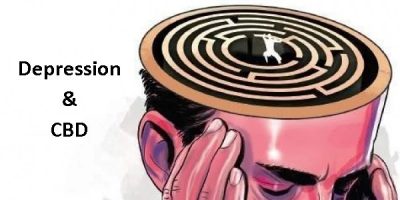In India, the National Mental Health Survey 2015-16 reveals that nearly 15% Indian adults need active intervention for one or more mental health issues and one in 20 Indians suffers from depression. It is estimated that in 2012, India had over 258,000 suicides, with the age-group of 15-49 years being most affected.

If you suffer from untreated depression, we urge you to seek professional support. However, recovering from depression is highly individual — and better results come with a combination of approaches, including holistic lifestyle changes and self-care regimen.
A growing number of people are using cannabidiol (CBD) products to assist in recovering from depression. If you’re considering adding CBD oil to your self-care routine, we’ve put together this article to help you understand the current scientific research about CBD and depression. Although clinical trials are lacking, there is good evidence that it could help your brain recover from depression.
Depression: The Origin
Many people still believe that depression is caused by a chemical imbalance — a serotonin deficiency. But this is a myth perpetuated by pharmaceutical advertisements. Serotonin is definitely part of the big picture — but the struggle is still out about who could use more or less serotonin, and depression is linked to many other neurotransmitter imbalances.
Furthermore, depression is also connected to conditions like inflammation and the structural brain changes resulting from trauma or chronic stress — all of which could be the real cause of the imbalances. Ultimately, there are a wide net of influences contributing to whether or not a person gets trapped by depression, including:
- Genetics
- Physical illness
- Chronic stress
- Stressful life events
- Past trauma
- Physical pain
- Social isolation
- Other emotional disorders
With so many different avenues leading to depression, it’s no surprise that there is no single miracle cure for it. What ends up helping a person recover from depression is highly individual, and people who take a multi-pronged approach to recovery often have better results than those who depend on a single solution.
Neural Regeneration: Fixing Your Brain
Although SSRIs cause an immediate spike in serotonin levels, it can take weeks before mood improves. So serotonin levels aren’t directly responsible for healing from depression.
It turns out that when people suffer from depression, a specific region of the brain can atrophy and even shrink — the area responsible for memory, learning and emotion (known as the hippocampus).
Fortunately, this unique part of the brain is also capable of recovering. It can grow new neurons and form new connections — a process called “neurogenesis” or “neural regeneration.” Research has since revealed the ability of our brains to change throughout our lives — an ability named “neuroplasticity.”
The real reason antidepressants work is that they actually stimulate neural regeneration in the hippocampus. This could be why antidepressants take weeks to kick in — brain neurons need time to heal, grow and form new connections. If this is news to you, that’s because the cutting edge of depression research right now is hippocampal neurogenesis.
What we’ve learned so far is that although antidepressants can help to stimulate neural regeneration, a wide variety of other lifestyle choices and supplements can also help with this process.

How CBD Stimulates Neural Regeneration
Cannabidiol recently gained FDA approval as a cannabis-derived drug to treat epileptic seizures. According to researchers, the major reason it works for seizures is that CBD protects neurons in the hippocampus — the exact brain area that is atrophied in depressed people — and there’s interesting evidence from both animal and human research:
- Rodent Evidence:In epileptic rats, CBD treatments reduce neuron atrophy and death in the hippocampus.
- Human Evidence:Like depressed people, chronic users of THC tend to have a smaller hippocampus, but CBD (in higher-CBD cannabis) helps prevent this shrinking.
- Endocannabinoids:Endocannabinoids are used throughout the brain and body to help regulate memory, appetite, inflammation and more. CBD’s impact on the endocannabinoid system is complex, but it appears to increase the brain’s natural levels of endocannabinoids. In mice, CBD increased levels of anandamide in the hippocampus — which then stimulated neuron growth.
- Brain-derived neurotrophic factor (BDNF):This protein helps existing neurons survive, while encouraging the growth of new neurons and connections (synapses). Multiple rodent studies have observed that CBD increases BDNF levels in the hippocampus while simultaneously reducing depressive symptoms. (However, not all studies agree, so this continues to be investigated.)
- Serotonin receptors:Similar to the antianxiety drug buspirone, CBD activates a type of serotonin receptor (5-HT1A). These receptors control a wide variety of other neurotransmitters, and buspirone has been shown to increase neurogenesis in the opossum hippocampus so it’s likely that CBD could have similar effects.
- PPARγ:When CBD binds to this receptor, it tells DNA to start manufacturing a wide range of neuron-protecting and anti-inflammatory compounds. Scientists recently discovered that this receptor also helps CBD stimulate hippocampal neurogenesis.
Clues that CBD Could Help with Depression
It’s one thing to prove that CBD helps protect and grow neurons (which it does) — but proving that it can be useful for treating a disease as complex as depression will be difficult. Although large-scale human trials are not available yet, some preliminary evidence is promising:
- Circumstantial evidence: There are conflicting reports about whether cannabis use contributes to depression or helps relieve it. However, when medical marijuana becomes available, young American men (ages 20-39) experience a drop in suicide rates. Also, a few years ago, a drug for weight loss was developed that worked exactly the opposite way from cannabis — by inhibiting the body’s endocannabinoid system. Shockingly, it was discontinued almost immediately because it drastically increased people’s risk for depression and suicide. Needless to say, the importance of endocannabinoids in mental health caught the attention of scientists.
- Experimental evidence — Clinical trials are currently underway to examine CBD’s effectiveness at relieving anxiety, and anxiety can be a major contributor to depression. Although we lack controlled experiments testing CBD as a treatment for depressed humans, pre-clinical experiments on rodents have been promising. CBD helped relieve depression in rats, even when they also suffered from diabetes. However, this benefit wasn’t immediate: Scientists had to give them a few doses of CBD, starting 24 hours before testing. Another study found that a single dose of CBD had rapid antidepressant effectson both mice and rats, lasting up to 7 days after the treatment. Additionally, in mice, CBD’s antidepressant effects are even more effective when combined with an SSRI. (In case you’re curious how scientists measure rodent depression…the most common experiment is to place mice or rats in deep water and record how long they keep swimming. The ones that give up faster are considered depressed. Don’t worry — the scientists don’t let them drown.)
Growing Your Brain Toward the Light
Depression is a mental trap. And it takes time and patience to rewire a depressed brain. If you suffer from depression, then harmful mental patterns can be reinforced by everything from your own thoughts, to imbalanced neurochemistry, to unhealthy neural connections. You might need support in all three of these categories to find a lasting recovery.
Although molecules (including CBD) can help your brain circuitry grow and form new connections, you’re still in charge of what types of new connections are made.

CBD is not a first-line depression treatment, although you might find it useful as part of a long-term recovery plan. If you’re in the middle of a crisis or considering suicide, we urge you to call a hotline or seek professional support. Also, talk with your doctor before incorporating CBD into your self-care routine, especially if you take prescription drugs with potential interactions.






